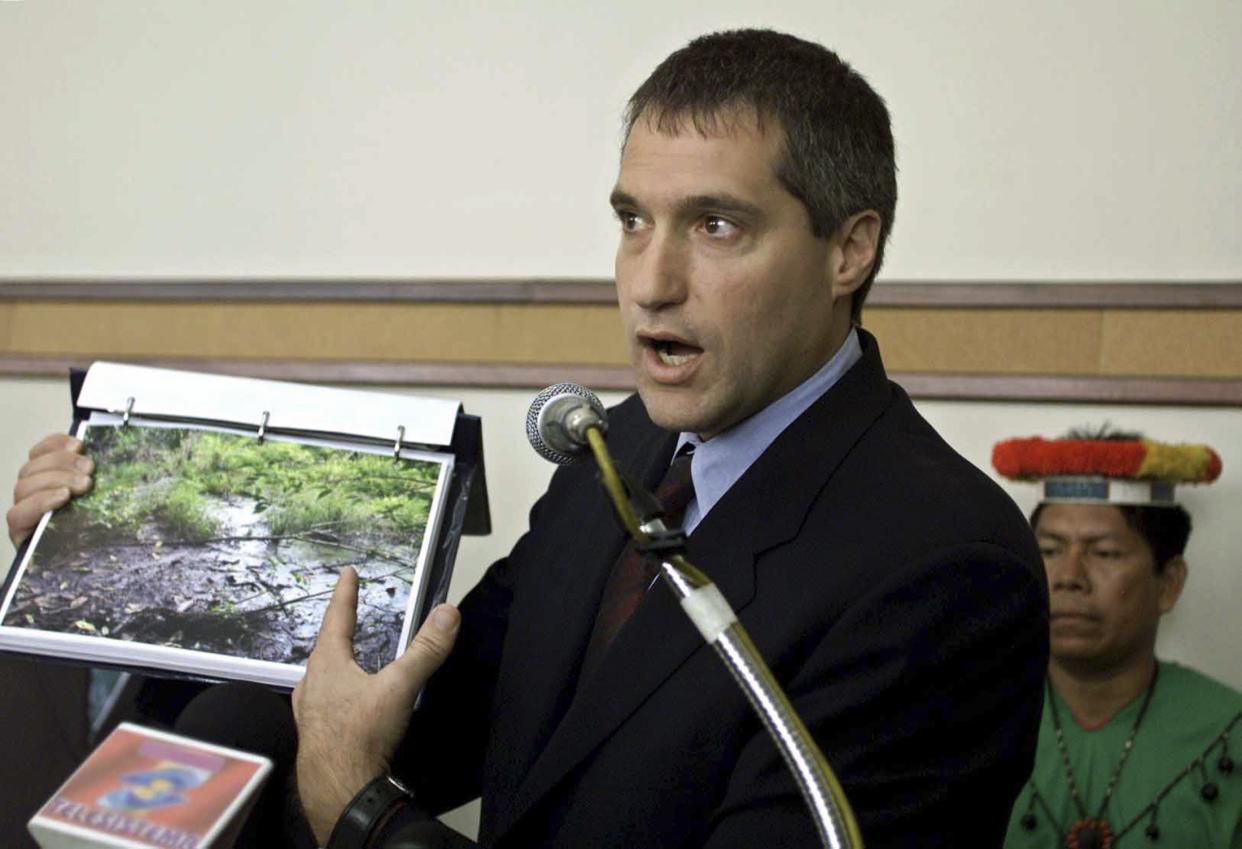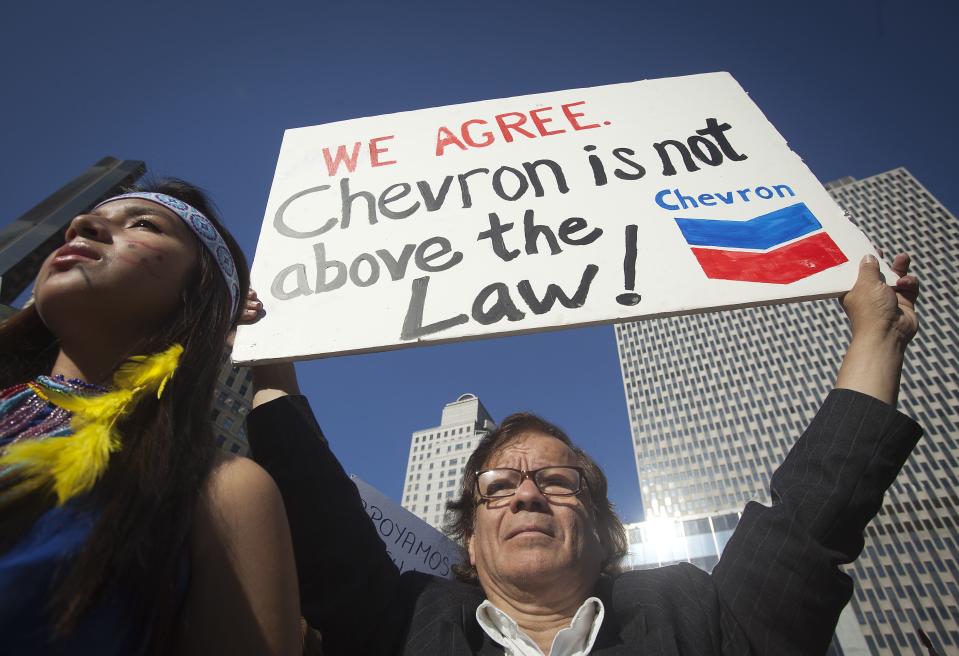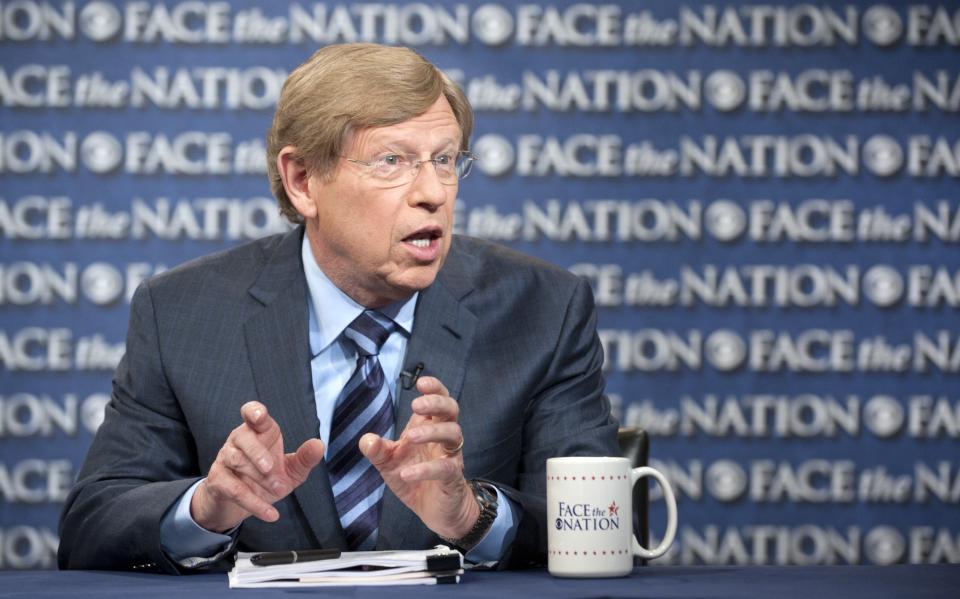Time is running short for a lawyer accused of defrauding Chevron

Time may be running short for New York lawyer Steven Donziger.
Chevron filed a brief this week, urging the U.S. Supreme Court to rebuff Donziger’s petition asking it to overturn a devastating judgment against him and his greatest achievement: a multibillion-dollar verdict in an environmental case he’d been pressing for more than 20 years.
Donziger’s campaign against Chevron reached its high-water mark six years ago, in March 2011, when he and a team of local lawyers won an $18 billion verdict—later reduced to $9.5 billion—in a provincial court in Lago Agrio, Ecuador, on behalf of residents of the Amazon region where Texaco, acquired by Chevron in 2001, had drilled from 1964 to 1992.
The verdict was hailed—and is still hailed in many quarters—as a historic vindication of the claims of Third World peoples, whose land and lives had been befouled by a soulless American corporation.
“We’ve won the case,” says Donziger, 55, in a self-produced video on his website, “but we’re still fighting.” The former journalist, Harvard Law graduate, and public defender continues: “We are facing what I believe is the most vicious, well-funded, corporate retaliation campaign ever—to destroy us.”
He’s talking about what happened in February 2011, when Chevron sued Donziger in Manhattan federal court for civil racketeering. Though U.S. District Judge Lewis Kaplan didn’t make a finding about whether the residents of Lago Agrio had been victimized by Texaco, which was outside the scope of the suit, he did conclude that Chevron had been repeatedly victimized by Donziger in both Ecuador and in the United States.
‘The ends do not justify the means’
In March 2014, after a seven-week trial, Kaplan issued a 485-page, 1,842-footnote ruling, finding that Donziger and his team had procured the Lago Agrio verdict through an elaborate, multi-year campaign of fraud, bribery, extortion, money laundering, and other offenses, which was largely orchestrated and funded from the United States.
Wrote Kaplan: “Even if Donziger and his clients had a just cause—and the Court expresses no opinion on that—they were not entitled to corrupt the process to achieve their goal. Justice is not served by inflicting injustice. The ends do not justify the means.”

Specifically, Kaplan found, Donziger’s team had directed their Denver-based consultants to ghostwrite a key damages report of an ostensibly neutral, court-appointed expert. When Chevron initiated U.S. litigation to expose this sham, Donziger’s team submitted an affidavit containing “half-truths or worse” to numerous U.S. judges in an effort to cover their tracks, Kaplan continued.
Then, when the truth finally came out, Donzinger’s team pulled off the most audacious stunt of all: They secretly ghostwrote the entire final opinion deciding the case, signed by Ecuadorian judge Nicolás Zambrano, in which Zambrano purported to disregard the ghost-written expert’s report, but reached essentially identical conclusions. Zambrano permitted Donziger’s team to write his ruling, Kaplan found, because the team had promised to pay him $500,000 from moneys eventually recovered from Chevron.
Donziger, who remains very much in demand as a speaker at human rights forums at the nation’s most prestigious universities, has vociferously denied any wrongdoing. But his appeal to the Second Circuit was a stunning wipeout. In a 127-page ruling written by Amalya Kearse, a President Jimmy Carter-appointee, the three-judge panel unanimously affirmed Kaplan’s ruling in its entirety.
Kaplan’s ruling is ‘as wrong as it is unprecedented’
So unless Donziger can persuade the Supreme Court to intervene, the stain of Kaplan’s withering assessment of the Lago Agrio judgment—that it was the product of outlandish corruption—will become indelible. To be sure, Donziger will always be able to take that judgment to any other country where Chevron has assets and see if its courts are willing to enforce it.
Donziger’s team has, in fact, already taken it to the courts of Canada, Argentina, and Brazil, and all of those cases are pending. But if Kaplan’s ruling becomes final, those judges will be hard-pressed to ignore the findings of the judge who has looked into the case more deeply than anyone (outside of Ecuador, at least) and whose findings have been upheld unanimously on appeal. (So far, the chief legal officers of Brazil and Argentina have recommended against enforcement of the Lago Agrio judgment in their countries, citing Kaplan’s findings, while a Gibraltar judge gave great weight to Kaplan’s opinion in fraud suits Chevron brought there against Donziger allies.)
The challenge of enticing the court to intervene has been taken up by constitutional lawyer and appellate specialist Deepak Gupta, of Gupta Wessler, in Washington, D.C. Wisely, in a case abounding with such unsavory accusations, Gupta is asking the court to focus with academic dispassion and surgical precision on two arcane, but weighty, legal issues.
To begin with, he claims, Chevron lacks “standing” to bring the suit—i.e., it hasn’t suffered sufficient injury—because the Lago Agrio plaintiffs have not tried to enforce the judgment in the United States, and have disavowed, in fact, any plan to do so. This sort of “preemptive collateral attack” on a foreign money judgment, he argues, is “as wrong as it is unprecedented.”
“If not set right,” Gupta continues, “disgruntled litigants from around the world will flock to Manhattan to air their grievances and seek an advisory opinion by a judge in New York.” This would, in turn, force “U.S. courts to sit as arbiters of the world’s judiciaries, at grave cost to international comity,” he writes. Comity refers to the respect that our courts are generally supposed to show toward other nation’s courts, lest our judiciary start interfering in foreign affairs, where the political branches of government (the president and Congress) are supposed to set policy.
Ted Olson: A ‘dormant and shallow’ circuit split
In response, Chevron’s lawyers, led at the Supreme Court level by former Solicitor General of the United States Theodore Olson, now of the Gibson Dunn & Crutcher law firm, argues that Chevron’s case “was neither preemptive nor a collateral attack.” Rather, they write, “Chevron pleaded and proved a pattern of racketeering and fraud that reached well beyond the misconduct in the Ecuadorian proceedings, to include extensive activities in the United States and its courts and other federal agencies.” The fact that Chevron is now laboring under a $9.5 billion judgment which Donziger is actively trying to enforce abroad, Chevron’s lawyers add, gives the company more than adequate standing.

Gupta’s second point is simple and clean. There has long been a “circuit split”—i.e., a disagreement between two federal circuit courts of appeals—about whether a private plaintiff in a civil case brought under the Racketeer Influenced and Corrupt Organizations Act (RICO) can obtain an injunction, which is the only relief Chevron asked for or received in this case. (Chevron waived damages shortly before trial, which is why Judge Kaplan was able to try the case without a jury. This way, the company knew it would receive a written ruling—something it could show to other courts around the world—rather than just a yes-or-no jury verdict. It also, of course, deprived Donziger, a skilled orator, of the chance to appeal to jurors’ emotions and political sensitivities.)
Since a key purpose of the Supreme Court is to resolve circuit splits, Gupta urges the Court to settle this one.
Olson, in response, admits that the circuit split exists, but downplays it as “dormant and shallow,” because it hinges on a 1986 decision of the federal appeals court in San Francisco which has not been followed by any other federal appeals court during the ensuing 31 years. (The federal appeals court that sits in Chicago ruled the way the Second Circuit did in 2001.)
‘Disgruntled litigants flocking to Manhattan’
In addition, Olson argues, when Kaplan issued his injunction (court order), he located his power to do not only in the RICO law but in state common law, which the Supreme Court is not empowered to address. Accordingly, Olson concludes, resolving the circuit split wouldn’t change the outcome of this lawsuit, rendering the case “an inappropriate vehicle” for doing so.
Still, of Gupta’s two arguments, the second seems to stand a better chance of attracting the Court’s attention. Despite his warning about “disgruntled litigants . . . flock[ing] to Manhattan to air their grievances,” the facts of this case are—thank goodness—not common. It seems unlikely that U.S. courts will be unmanageably flooded with filings by American corporations able to prove that American lawyers have masterminded vast racketeering conspiracies, orchestrated and financed from the United States, that resulted in corrupt foreign judgments.
Whether the court will see fit to resolve the longstanding circuit split, on the other hand, is anyone’s guess. Likewise, if the court does take the case, how they’d decide that issue seems like a coin flip.
In an email, Donziger writes that notwithstanding the “critically important issues” his team has raised in his petition, “ultimately the key factual and legal questions will be decided in Canada and other jurisdictions where courts will review the evidence that devastates the findings of the district court.”
A spokesman for Chevron writes, also in an email: “Steven Donziger and his associates were found by a U.S. court to have committed racketeering, extortion, money laundering, wire fraud, witness tampering and obstruction of justice in obtaining an Ecuadorian judgment against Chevron. That decision was unanimously upheld. . . . We do not think Donziger’s latest attempt to distract from his fraudulent behavior is worthy of Supreme Court review.”
Donziger’s petition will likely be considered by the justices at a conference in June, and decided shortly thereafter.
If the Court does deny review, the case would go back to Judge Kaplan, where Chevron had filed a motion seeking attorneys fees from Donziger. Kaplan postponed ruling upon that motion until after the appeals ran their course. At the time the motion was filed, more than three years ago, Chevron was seeking $32,334,584 from Donziger.
Roger Parloff writes about law and business.
More from Roger Parloff:
Treasured Burgundy vineyards are at risk due to late frost
Trump U alum still fighting for her day in court
The Supreme Court could fundamentally change America’s broken patent system

